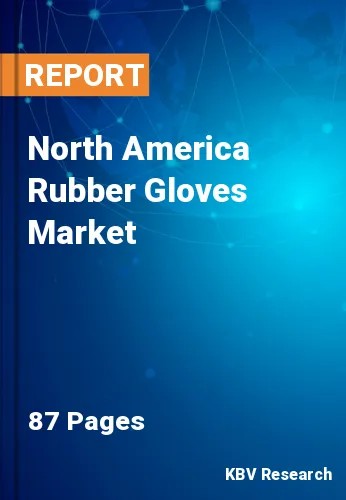The North America Rubber Gloves Market would witness market growth of 2.9% CAGR during the forecast period (2022-2028).
Rubber gloves should be worn with a skin-tight fit that allows the hands to breathe while making it easier to handle and operate items. Typically, the palms and fingers have a raised pattern that facilitates a firm grasp while handling goods. When gloves are worn, the hands are protected from strong detergents and other cleaning agents used in the house and elsewhere. Popular among professional cleaners and for clearing up in stores, cafés, and other public spaces, these gloves are traditionally employed by individuals cleaning the home.
The thickness of the gloves and the length of the cuffs give good protection for all general cleaning duties, are ideal for all chores requiring immersion of the hands in water, and offer protection for vacuuming, dusting, and polishing. Latex, a kind of rubber, is the most prevalent substance used to make home gloves. Typically, gloves include a cotton "flock" inside for easy donning and doffing. They come in a greater variety of colors and cuff lengths.
Concerns with latex rubber include allergic responses and inadequate resistance to chemicals such as solvents. PVC, nitrile, and neoprene are further materials used to mitigate this. Natural rubber that has been chemically treated to minimize the number of antibody generators, such as Vytex Natural Rubber Latex, can be used to manufacture gloves that preserve the qualities of conventional rubber while exposing the user to considerably lower levels of latex allergens.
When the United States entered World War II, the capability to produce synthetic rubber had already been in existence for more than twenty years. Standard Oil in the United States. Standard Oil was based in the United States, after purchasing the Zeppelin patents in 1924, the American corporation Goodyear began conducting research in the field of synthetic rubber the following year. By 1933, the company had made synthetic rubber research a full-time endeavour. After another four years, Goodyear manufactured and evaluated the first synthetic rubber tire to be developed in the United States.
The US market dominated the North America Rubber Gloves Market by Country in 2021; thereby, achieving a market value of $3.5 billion by 2028. The Canada market is experiencing a CAGR of 5.2% during (2022 - 2028). Additionally, The Mexico market would exhibit a CAGR of 4.3% during (2022 - 2028).
Based on Product, the market is segmented into Disposable and Durable. Based on Material, the market is segmented into Natural Rubber/Latex, Nitrile, Neoprene and Others. Based on Type, the market is segmented into Powdered and Powder-free. Based on Distribution Channel, the market is segmented into Offline and Online. Based on End-use, the market is segmented into Medical & Healthcare, Automotive, Chemical & Petrochemical, Metal & Machinery, Oil & Gas, Pharmaceutical, Cleanroom, Food & Beverage and Others. Based on countries, the market is segmented into U.S., Mexico, Canada, and Rest of North America.
Free Valuable Insights: The Global Rubber Gloves Market is Estimated to reach $16.4 Billion by 2028, at a CAGR of 3.5%
The market research report covers the analysis of key stake holders of the market. Key companies profiled in the report include Ansell Ltd., Kimberly-Clark Corp., Unigloves Ltd., MCR Safety, Top Glove Corporation Bhd, Hartalega Holdings Berhad, The Glove Company, MAPA Professional, Adenna LLC and Atlantic Safety Products, Inc.
By Product
By Material
By Type
By Distribution Channel
By End-use
By Country
Our team of dedicated experts can provide you with attractive expansion opportunities for your business.

